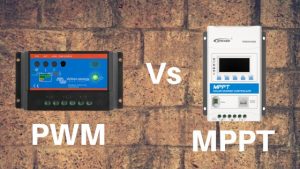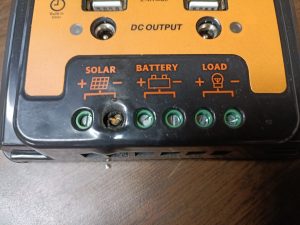We frequently get the question about our solar panels –
“Are they 12v or 24v?“

This post answers that question and dispels old myths that haunt the solar industry.
The fact is that most people who are wondering if a panel is 12 volts or 24 volts have been told that solar panels must match the battery voltage. This is ONLY true if you are using a PWM charge controller.
With an MPPT charge controller, the voltage does not matter as the charge controller switches the power down to the right voltage for your batteries.
MPPT stands for Maximum Power Point Tracking. MPPT is a technology that allows the charge controller to observe and regulate the energy going from solar panel to the batteries. Solar panels show changeable outputs according to weather conditions. MPPT charge control devices can match the solar panel voltage with battery voltage to maximize the charge efficiency. In these systems, the full power of solar panels can be used by balancing between voltage and current according to the P = V x A equation. For example, the amount of current drawn from the panels reduced to protect the voltage when the weather is cloudy. When the weather is sunny, it is allowed to draw more current.
The primary difference between PWM and MPPT charge controllers is that the MPPT devices are more efficient. MPPT charge controllers are 30 % more efficient in charge efficiency compared to their PWM cousins. Panel voltage and battery voltage should be matched in PWM systems. In MPPT systems, the panel series are allowed to have higher voltage than batteries. This means more flexibility for system growth.
MPPT charge controllers are a little more expensive compared to PWM, but their efficiency greatly outweighs this small extra cost. With this extra efficiency, you get extra features that make life with solar easier, such as wifi, large LCD screens (sometimes color), better heat dissipation, and battery temp monitoring. Also, MPPT charge controllers are usually a lot safer due to having better build quality.
Another issue facing PWM charge controllers is that they are usually cheap in both price and build quality. We have seen many examples of cheap PWM charge controllers that have had a catastrophic internal short causing the unit to literally melt down. A charge controller the size of the thermostat in your Kitchen is not going to be reliable. Here are some examples:


In summary, there’s no need to worry about the voltage of your solar panels if you choose a modern and efficient MPPT charge controller for your solar system.

